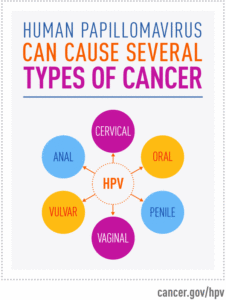
Though anal cancer is strongly linked to HPV, anal intercourse is not necessary to contract this virus that can lead to this cancer.
Did you know that 95% of anal cancer cases are caused by the human papillomavirus (HPV)?
This stat comes from analcancerfoundation.org, though cdc.gov/hpv/cancer.html says it’s 91%.
Intercourse is not necessary to transmit HPVs that ultimately can cause anal cancer, says analcancerfoundation.org.
Intercourse (vaginal or anal) is also not required to transmit the HPVs that can eventually cause cervical, vulvar, penile or oral cancers, says the foundation.
In fact, the foundation states that HPV can also be transmitted from person to person by deep kissing, manual stimulation of the genitalia, rubbing, sex toys…
In addition, researchers with the University of Hawaii HPV Cohort Study point out that “the majority of cervix-to-anus transmission” of HPV “happened in the absence of anal intercourse.”
The article concludes: In short, anal intercourse is not a pre-requisite for getting anal cancer.
Sources: analcancerfoundation.org/learn/anal-cancer/ and cdc.gov/hpv/cancer.html
Another site, cancer.org, specifically states: HPV is passed from one person to another during skin-to-skin contact with an infected area of the body.
The site notes that HPV can be spread during the act of sex—any kind (anal, vaginal and oral)—but that sex is not necessary for HPV to spread.
All that is needed is for there to be skin-to-skin contact with an area of the body infected with HPV.
In fact, HPV can be spread through non-intercourse genital-to-genital contact, and even with just hand-to-genital contact.

This ubiquitous virus can spread from one body part to another, e.g., from genitals to anus—without the assistance of the victim’s partner.
HPV is really out there. The site states that it “might be possible” to protect against a genital infection with this virus by forbidding people to contact your genital and anal regions.
However, the site says that there may still be undiscovered ways that HPV can make it into someone’s body.
For reasons not known, HPV infections mainly occur in women when they are under age 30.
Cancer.org says that the mean age of diagnosis (men and women) is 62. It takes many years for an HPV infection to develop into anal cancer.
This is not a disease where one contracts HPV in a particular year, and then three years later gets the dreaded diagnosis.









































